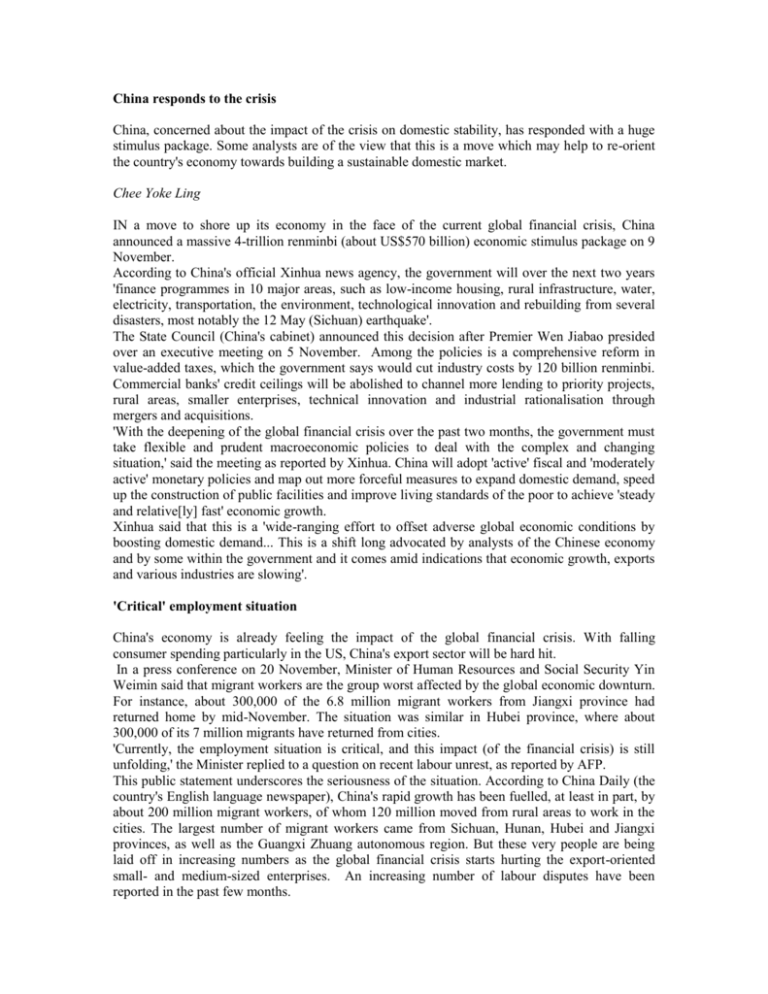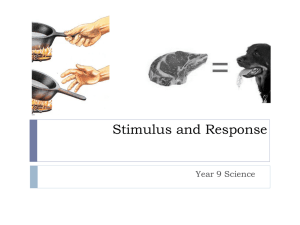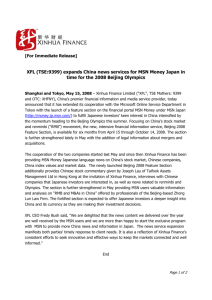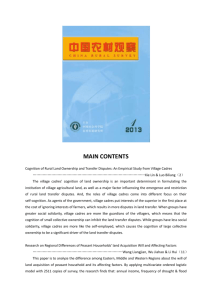China responds to the crisis
advertisement

China responds to the crisis China, concerned about the impact of the crisis on domestic stability, has responded with a huge stimulus package. Some analysts are of the view that this is a move which may help to re-orient the country's economy towards building a sustainable domestic market. Chee Yoke Ling IN a move to shore up its economy in the face of the current global financial crisis, China announced a massive 4-trillion renminbi (about US$570 billion) economic stimulus package on 9 November. According to China's official Xinhua news agency, the government will over the next two years 'finance programmes in 10 major areas, such as low-income housing, rural infrastructure, water, electricity, transportation, the environment, technological innovation and rebuilding from several disasters, most notably the 12 May (Sichuan) earthquake'. The State Council (China's cabinet) announced this decision after Premier Wen Jiabao presided over an executive meeting on 5 November. Among the policies is a comprehensive reform in value-added taxes, which the government says would cut industry costs by 120 billion renminbi. Commercial banks' credit ceilings will be abolished to channel more lending to priority projects, rural areas, smaller enterprises, technical innovation and industrial rationalisation through mergers and acquisitions. 'With the deepening of the global financial crisis over the past two months, the government must take flexible and prudent macroeconomic policies to deal with the complex and changing situation,' said the meeting as reported by Xinhua. China will adopt 'active' fiscal and 'moderately active' monetary policies and map out more forceful measures to expand domestic demand, speed up the construction of public facilities and improve living standards of the poor to achieve 'steady and relative[ly] fast' economic growth. Xinhua said that this is a 'wide-ranging effort to offset adverse global economic conditions by boosting domestic demand... This is a shift long advocated by analysts of the Chinese economy and by some within the government and it comes amid indications that economic growth, exports and various industries are slowing'. 'Critical' employment situation China's economy is already feeling the impact of the global financial crisis. With falling consumer spending particularly in the US, China's export sector will be hard hit. In a press conference on 20 November, Minister of Human Resources and Social Security Yin Weimin said that migrant workers are the group worst affected by the global economic downturn. For instance, about 300,000 of the 6.8 million migrant workers from Jiangxi province had returned home by mid-November. The situation was similar in Hubei province, where about 300,000 of its 7 million migrants have returned from cities. 'Currently, the employment situation is critical, and this impact (of the financial crisis) is still unfolding,' the Minister replied to a question on recent labour unrest, as reported by AFP. This public statement underscores the seriousness of the situation. According to China Daily (the country's English language newspaper), China's rapid growth has been fuelled, at least in part, by about 200 million migrant workers, of whom 120 million moved from rural areas to work in the cities. The largest number of migrant workers came from Sichuan, Hunan, Hubei and Jiangxi provinces, as well as the Guangxi Zhuang autonomous region. But these very people are being laid off in increasing numbers as the global financial crisis starts hurting the export-oriented small- and medium-sized enterprises. An increasing number of labour disputes have been reported in the past few months. The Dongguan Manufacturing Association has estimated that up to 2.5 million migrant workers in south China's Pearl River Delta may lose their jobs in the next few months because of the deepening worldwide economic crunch. Already, as AFP reported on 19 November, thousands of workers had recently gathered outside shuttered factories in Guangdong province, demanding unpaid wages and forcing local authorities to intervene. Xu Ming Zhen, a domestic helper in Beijing, said that for the past few years her village in the province of Sichuan had mostly the elderly and very young. Men and women of working age had practically all left for the cities to work - now many are returning home unemployed. The government had already planned to engineer a move away from low-value-added manufacturing of consumer goods such as toys and clothing to higher-value-added economic sectors. There has also been renewed emphasis on rural development under the current five-year development plan. The financial crisis has crunched the timeline and there are concerns that the jobless millions forced to return to the countryside may fuel rural instability. There is already unrest due to the social inequalities from the past 30 years of economic reform that have seen the countryside falling behind the major urban/industrial centres. Rural income is generally about a third that of the urban population. With the current situation, there have been almost daily reports of protests in the affected parts of the country. Xinhua wrote, 'The policy change comes out in time as the global financial crisis begins to affect China's real economy.' The report quotes the director of the Research Institute for Fiscal Science of the Ministry of Finance, Jia Kang: 'The adjustment is more resolute and timely as China draw lessons from the Asian financial crisis in 1998.' He noted the easing policy was expected to prevent big ups and downs in the economy and that the value-added tax reduction would encourage enterprises to invest more in the long run. Market analysts have been generally optimistic about China's move. According to a Time magazine web report dated 10 November, while the short-term boost that the economic stimulus package would give to China was the centre of attention in Asia following its announcement, some analysts said the move marks a significant turning point in the development of China's economy that will be felt for years to come. 'I think in a decade, we'll be looking back at this moment and saying, "This was it. This was when things really changed and China's economy transitioned from externally, export-oriented to an internal focus",' says Ben Simpfendorfer, a China economist with the Royal Bank of Scotland in Hong Kong, in the Time article. He Liping, a professor of economics at Peking University, was quoted in the same article as saying, 'I personally see this crisis as an opportunity to reduce our dependence on export and adopt a healthier path.' A Merrill Lynch report has forecasted that the package will add an annual 3% to China's GDP in 2009-2010. While there are some economists who are less optimistic, another Time article dated 1 December said, 'China, as it has proved repeatedly over recent decades, is different. It remains a unique mixture of raging, very visible capitalism resting on a foundation of state domination that despite much change is still formidable. State-owned enterprises, the Merrill report points out, account for 33% of industrial value added, and 45% of urban fixed investment.' So China's state-managed economy may well be its saving point. Boosting domestic demand The government is targeting not only public spending on infrastructure and projects but also greater spending by Chinese consumers who are well known for having the world's highest household-savings rate. According to the Xinhua report, the State Council meeting on 5 November decided that credit expansion must be 'rational' and 'target spheres that would promote and consolidate the expansion of consumer credit.' The Time report describes the stimulus package and the recent expansion of social welfare and amendments to the rural land law that will enable peasants to effectively lease out the right to use their land, as 'a political triumph for President Hu Jintao and his Premier, Wen Jiabao. The two men have been stressing the importance of measures aimed at relieving poverty in the countryside since coming to office in 2003. Until now, their efforts to enact concrete measures to back those promises have often been frustrated by opponents within the Communist Party who believe the government's No. 1 priority should be to continue encouragement of booming economic growth'. Meanwhile the social security system needs immediate attention. 'The government should also use the momentum to spend more and revamp its social security system, to further help labourers deal with the economic challenges,' China Daily quoted Cai Fang, a labour economics specialist with the Chinese Academy of Social Sciences in Beijing, who is also a member of the Standing Committee of the National People's Congress, as saying. 'Most labourers worry about their welfare, retirement funds or unemployment benefits,' said Cai, who also suggested the government continue to remove the individual income tax from more low-income labourers. Timeliness of positive effects While many inside and out of China welcome the government's major economic stimulus move, questions remain on when the positive effects of the proposed measures will filter through the economy. With its heavy dependence on exports, there is urgency in the 'catch-up' time between stimulus and response. The beginning of the exodus back to the countryside is one major concern. The possibility of inflation that accompanies such stimulus packages appears to be at bay for the time being as the government continues to aggressively control inflation. A recent JPMorgan report cited government statistics that China's Producer Price Index 'declined sharply to 6.6% year-on-year in October, from 9.1% in September'. What about China and the rest of the world? Some economists believe that continued Chinese demand for raw materials, machinery and consumer goods could help other Asian economies. However, they also caution that even with a double-digit growth rate, China's economy is not yet large enough by itself to sustain the global economy. The country accounts for only about 5% of total world GDP compared to the 28% share of the US. The success of China's stimulus package is therefore first and foremost about domestic stability. Beijing-based Chee Yoke Ling is legal adviser and environment coordinator of the Third World Network.







